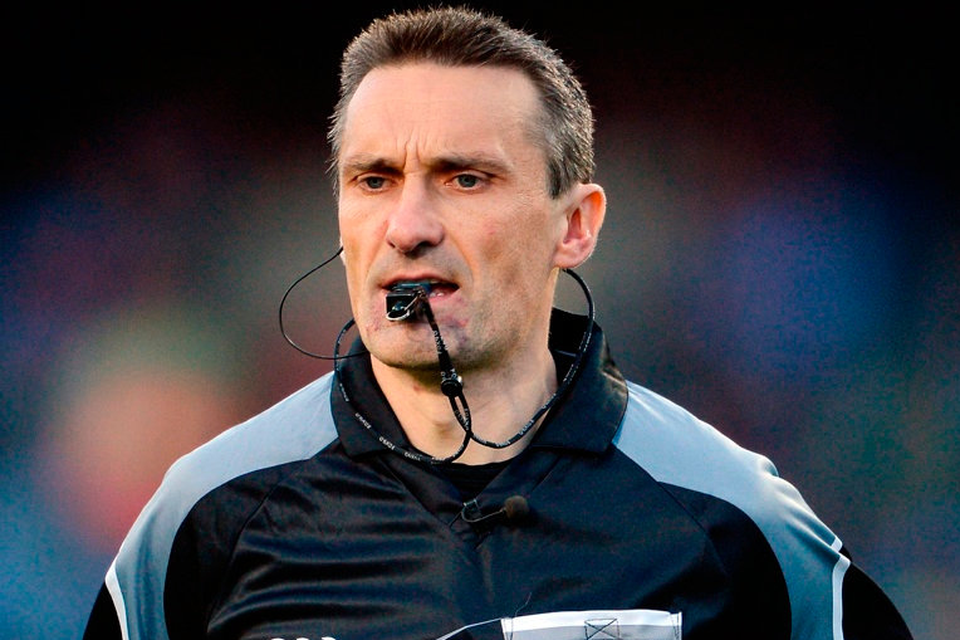Colm O'Rourke: The black cards and marks are one thing but the real poison is cult of handpassing
Referees being honest about mistakes is refreshing but the rules still need fine-tuning
Referee Maurice Deegan. Photo: Piaras Ó Mídheach/Sportsfile
Last week we got another airing of the black card. The referee from the All-Ireland final replay, Maurice Deegan, disclosed that he should have sent John Small off in the game but the other two he sent off were correct decisions.
First of all, it is unusual - or maybe even a first - for a referee to say he got it wrong. Secondly, I have always felt that Lee Keegan was sent off in error as the black card is supposed to be for deliberately pulling down an opponent. Just because a player ends up on the ground does not mean it is a black card, and the actions of the Dublin players who were near that incident in the game certainly put pressure on the referee, who made a wrong decision and robbed Mayo of the best player in the country.
When a year is just as much dominated by a rule as players, it surely signifies that there is something wrong with the rule - either in implementation or design. The black card has its uses. It has largely been instrumental in getting rid of body-checking after a player passes the ball over an opponent's head and tries to run on for the return, even if some players will run into the opponent in the hope of getting a black card dished out.
Yet I have been at many games this year where controversy has reigned with players being sent off for supposedly tripping with the hand or some very silly indiscretion, while more serious offences are just getting a yellow card. What is needed with the black card is a re-writing of the rule which means only very obvious dragging down and body-checking are punished in this category.
Sledging an opponent was supposed to be a black-card offence but I have not seen anyone walking the plank for this. So those who make discreet inquiries about an opposing player's mother or sister and their nocturnal habits have not been checked.
It would be nice to think that black cards would be less controversial next year and anyone who thinks that it is working well needs to have a serious look at themselves. The intention and practice of the rule are completely different, so modification is needed.
Even last Sunday there was more controversy. I was trying to eat my dinner with two eyes while keeping one on the The Nire and Dr Crokes when the referee sent off a Nire player for a black card which was no more a black card than there are frogs on the moon. I nearly swallowed a big spud in frustration.
No wonder then that many people would like to see this rule completely abolished, and if the administrators do not make some adjustments the shrill voices will get even louder. And rightly so. It is a mess in its present form and application.
All of this debate in Croke Park was a sideline to the announcement of the mark being introduced in the new year. It has already been trialled in Higher Education League games and the students have not appeared to have found it much of an inconvenience, while causing minimal disruption to the game.
Anyway, students are not a group who should be trusted with an opinion; they are supposed to be young, immature and reckless. Unfortunately, they all seem to be taking their studies very seriously now, and their football even more seriously.
The change at county level is likely to be minor. I don't know how many high catches or even low catches there are on average in a championship match but I'm sure all that data was collated before this decision was made. It won't make a blind bit of difference to Dublin.
Stephen Cluxton will still kick out the same way and the player receiving will probably play on, rather than take a static mark, in the vast majority of cases. This rule is harking back to an era where every kick-out landed in the middle of the field and there was great high-catching. The only problem was there was no such era, at least in the last 40 years that I have been watching football.
On any day if there was half-a-dozen clean catches it was a record. Most eras have been dominated by rucks in the middle of the field with players breaking the ball. The incentive to do so now is increased and the instruction from the manager will be to stop their big men catching at all costs. Of course, if there is a brilliant catch it does reward good hands.
If anyone thinks it is going to mean seven-foot midfielders on every team then forget it. There will be no raiding of American basketball teams to get a beanpole who would just catch and kick. So no Michael Jordans, Scotty Pippens or Shaq O'Neills. Cluxton did away with all the dinosaurs. Nowadays a midfielder must be able to run about 15 kilometres, tackle, field and score. So more Brian Fenton than Magic Johnson, LeBron James or Stephen Curry.
Where the mark might be of more benefit will be at club level, where the kick-outs are generally more down the middle. A couple of good fielders in this area might get a team 10 good possessions in a game without being set upon by a crowd of hyenas from the opposition. How often does this end up with a free against the fielder? At least now he is protected.
It may be of even more benefit in junior club football. The big man in the middle who may not be too fit could catch the ball, have someone lined up to run in and give him a drag on a fag before he would lash it downfield as long and high as he could.
In the rush for speed on the pitch this is a way of slowing things down. No harm in that either. Football was not designed for pure athletes. It should accommodate the portly corner-forward with the ability to sniff out a goal while Roundy Murphy at corner-back, who carried a bit of timber, also added a bit of character to affairs. Any man now with a bit of ballast is looked down on. They were often the entertainers, so if club football slows down a little it won't do any harm at all.
Anyway, black cards and marks are only tinkering slightly with the game while the main poison - continuous handpassing - is left unchecked. The mark might bring some benefits but players will play on from the vast majority of marks with - yes, you've guessed it, a handpass.
Join the Irish Independent WhatsApp channel
Stay up to date with all the latest news














